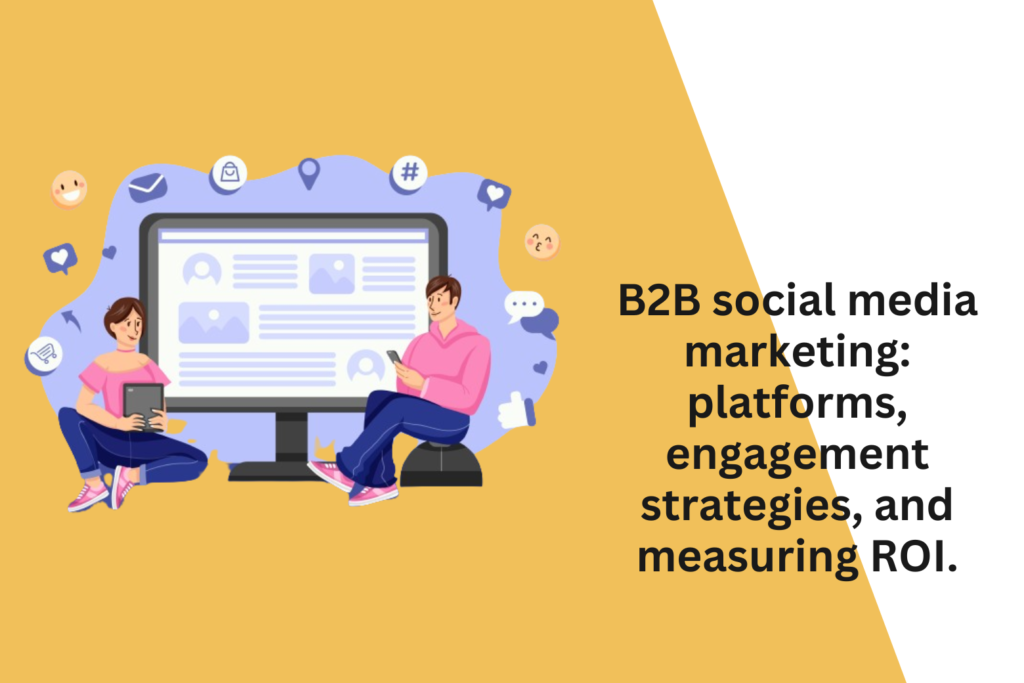
B2B social media marketing has become an essential component of overall marketing strategies, providing opportunities for brand visibility, audience engagement, and lead generation. Here’s a comprehensive guide on B2B social media marketing, covering platforms, engagement strategies, and measuring ROI:
1. Choosing the Right Platforms:
LinkedIn:
- Audience: Professionals, businesses, decision-makers.
- Purpose: Networking, thought leadership, lead generation.
- Content: Industry insights, thought leadership articles, company updates.
Twitter:
- Audience: Professionals, businesses, industry influencers.
- Purpose: Real-time updates, engagement, brand personality.
- Content: Short updates, industry news, live event coverage.
Facebook:
- Audience: Businesses, professionals, a broad consumer audience.
- Purpose: Brand awareness, community building, content sharing.
- Content: Visual content, blog posts, company culture.
Instagram:
- Audience: Businesses, professionals, younger demographics.
- Purpose: Visual storytelling, brand aesthetics.
- Content: High-quality visuals, behind-the-scenes, product showcases.
YouTube:
- Audience: Professionals, businesses, visual learners.
- Purpose: Video content, tutorials, product demos.
- Content: Webinars, explainer videos, customer testimonials.
2. Engagement Strategies:
Content Marketing:
- Strategy: Create and share valuable, educational content relevant to your industry.
- Benefits: Establish thought leadership, drive traffic to your website.
Community Building:
- Strategy: Foster a sense of community by engaging with your audience, responding to comments, and encouraging discussions.
- Benefits: Increased brand loyalty, word-of-mouth marketing.
Employee Advocacy:
- Strategy: Encourage employees to share and engage with company content on their personal profiles.
- Benefits: Amplify reach, humanize the brand, build trust.
Influencer Marketing:
- Strategy: Partner with industry influencers to promote your products or services.
- Benefits: Access new audiences, leverage influencer credibility.
Paid Advertising:
- Strategy: Utilize targeted advertising on platforms like LinkedIn and Twitter to reach specific B2B audiences.
- Benefits: Increased visibility, precise audience targeting.
Webinars and Live Events:
- Strategy: Host webinars and live events to showcase expertise and engage directly with your audience.
- Benefits: Establish thought leadership, generate leads.
3. Measuring ROI:
Lead Generation:
- Metrics: Track the number of leads generated through social media campaigns.
- Tools: Use social media analytics tools, CRM integrations.
Engagement Metrics:
- Metrics: Monitor likes, shares, comments, and click-through rates.
- Tools: Platform analytics, third-party tools.
Website Traffic:
- Metrics: Measure the amount of traffic driven to your website from social media.
- Tools: Google Analytics, social media analytics.
Conversion Rates:
- Metrics: Evaluate the conversion rates of social media-generated traffic.
- Tools: Google Analytics, conversion tracking tools.
Brand Mentions and Sentiment:
- Metrics: Monitor brand mentions and analyze sentiment.
- Tools: Social listening tools, sentiment analysis tools.
Customer Acquisition Cost (CAC):
- Metrics: Calculate the cost of acquiring a customer through social media efforts.
- Tools: Combine advertising costs with conversion data.
4. Best Practices:
Consistent Branding:
- Tip: Maintain consistent branding across all social media platforms.
- Reason: Builds brand recognition and trust.
Data-Driven Decisions:
- Tip: Base strategies and decisions on data and analytics.
- Reason: Ensures the effectiveness of campaigns and improves ROI.
Engagement and Responsiveness:
- Tip: Engage with your audience and respond to comments and messages promptly.
- Reason: Builds a positive brand image and fosters relationships.
Strategic Content Calendar:
- Tip: Plan and schedule content in advance with a strategic content calendar.
- Reason: Ensures consistency and alignment with business goals.
A/B Testing:
- Tip: Conduct A/B testing on ad creatives, copy, and targeting.
- Reason: Optimizes ad performance and maximizes ROI.
Conclusion:
B2B social media marketing involves a strategic approach to platform selection, engagement, and ROI measurement. By understanding the unique dynamics of each platform, implementing effective engagement strategies, and using data to measure and optimize results, B2B organizations can leverage social media as a powerful tool for brand building, lead generation, and business growth.



